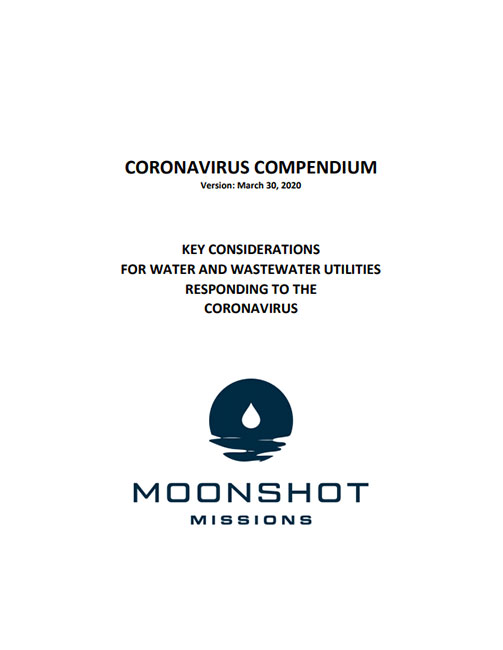View CWEA’s round-up of Coronavirus (COVID-19) worker safety information here >
 From George Hawkins, President of Moonshot Missions and the former General Manager of DC Water…
From George Hawkins, President of Moonshot Missions and the former General Manager of DC Water…
Water and wastewater services are essential to deliver clean drinking water and ensure safe waterways during the response to the Coronavirus. Water utilities are committed to providing these services, even as the Coronavirus has direct impacts on operations, staffing and finances. Utilities must ensure these essential services are delivered, while protecting the people who make it happen, as well as the facilities, equipment and of course, the customer.
Moonshot Missions, a non-profit organization founded by George Hawkins, the former General Manager of DC Water in Washington DC, has put together a compendium of best practices being implemented by water utilities in the face of this unprecedented challenge. Moonshot staff has compiled this checklist by reviewing resources from water associations, list-serves and dozens of utility response and continuity of operations plans.
We plan for this to be a “living document” that evolves as new practices are implemented. Please email [email protected] if you have suggestions or feedback.
We seek only to organize the wisdom you are gaining from your efforts to maintain critical water operations and welcome your insights so we can make them available to a wide audience. Please continue to reference the “Table of Contents” for routine updates to sections of this compendium.
We suggest scanning the Compendium to compare its suggestions with your current actions to assess whether any of the ideas might be helpful in your Coronavirus response. In summary, Moonshot believes that the following steps are critical for water utilities to protect their staff thereby preserving critical staffing knowledge and their capacity needed to sustain operations:
We recognize that most water utility managers will have already done most if not all of these measures. However, we feel that if even one utility benefits by one of these suggestions, then the compilation of these practices will have been well worth it. The Compendium that follows goes into these best practices in greater detail. We at Moonshot Missions salute the tremendous work that each of you are doing to protect the public health and the environment, every minute of every day. We sincerely wish you all well during this challenging time.
George S. Hawkins, Esq.
Founder and President
Andy Kricun, P.E.
Managing Director
Sarah Neiderer, MPH
Senior Director of Utility Assessments
Stephanie Eatinger
Utility Assessment Specialist
Natalie Hawkins
Chief of Operations
Henderson Brown, Esq.
Counsel